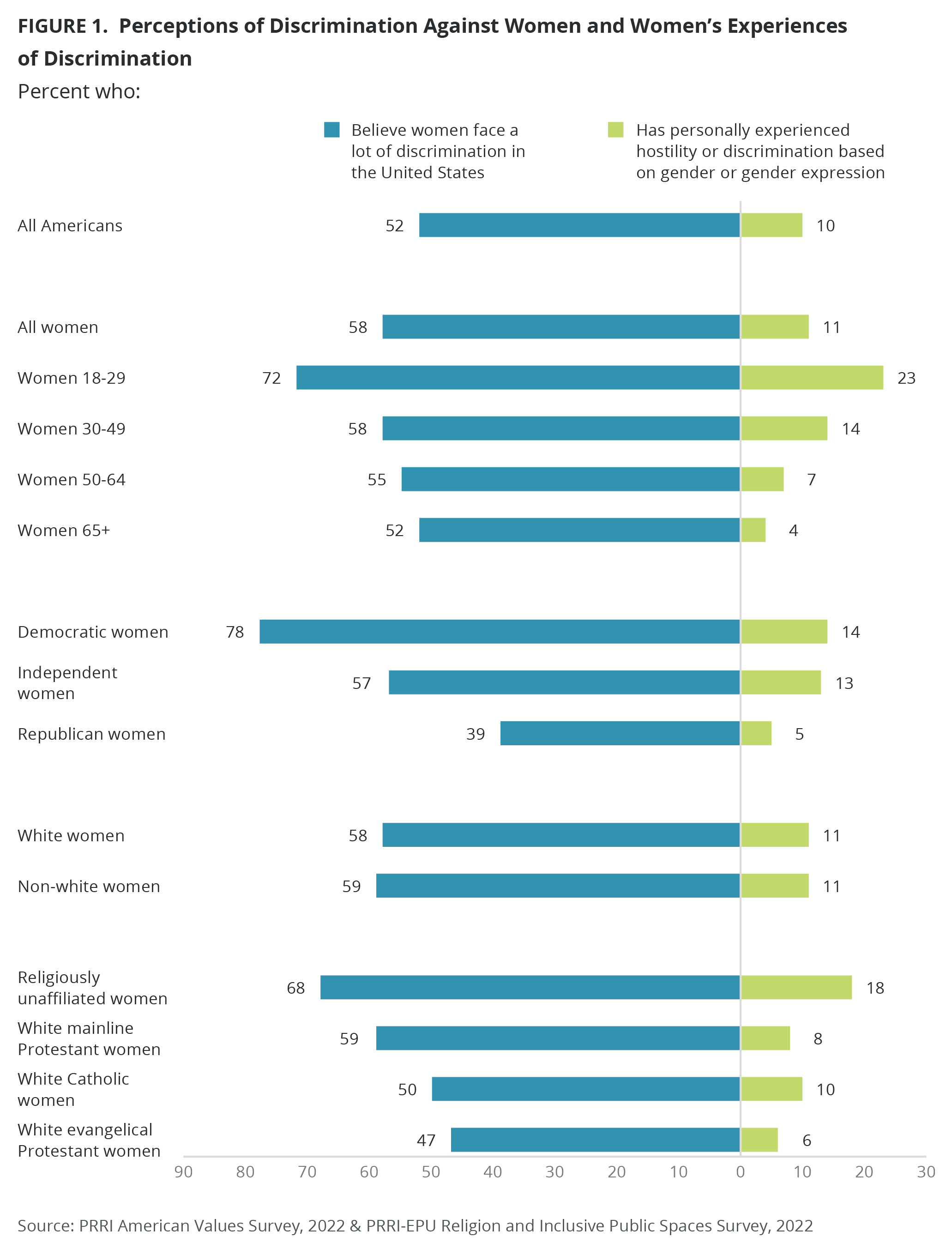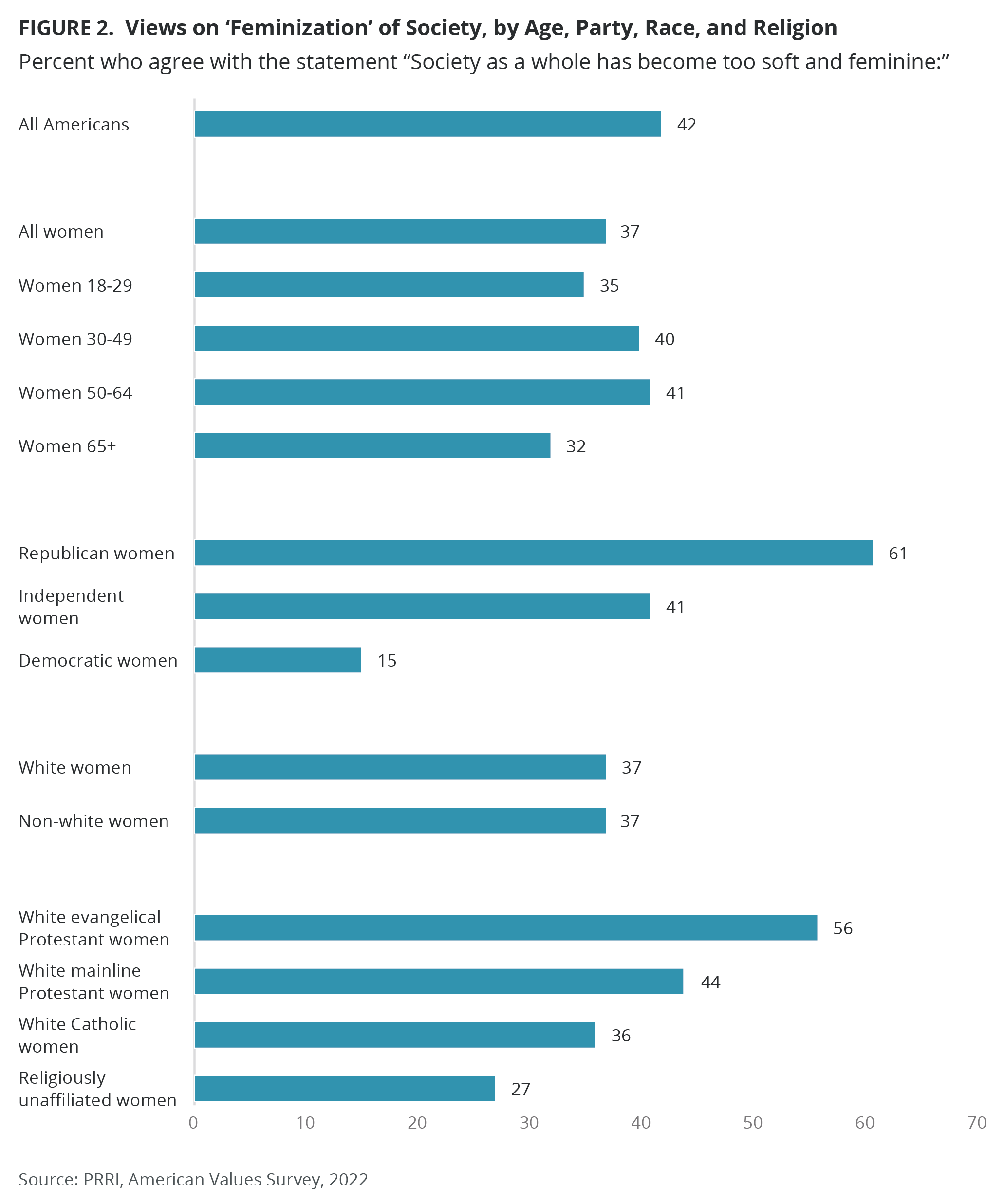While shattering box office records, the new Barbie movie has renewed conversations about gender roles, women’s empowerment, and women’s equality. As the United States marks Women’s Equality Day on August 26, which honors more than 100 years of women’s suffrage guaranteed by the 19th Amendment, now is a good time to consider what American women think about discrimination facing women in today’s society — and whether they have personally faced such discrimination. How do party, religion, race, and age drive differences in women’s attitudes about discrimination? Do these demographic factors also impact women’s attitudes on whether America has become too soft and feminine?
Women’s Views and Experiences of Discrimination
By Age
According to the 2022 PRRI American Values Survey, the majority of Americans (52%) believe there is a lot of discrimination against women. Among women, this percentage increases to nearly six in ten (58%). Women ages 18-29 are more likely than women of other ages to agree that women face a lot of discrimination in the United States (72% vs. 58% of women 30-49, 55% of women 50-64, and 52% of women 65+).
According to PRRI’s Religion and Inclusive Spaces Survey, one in ten women say they have personally experienced hostility or discrimination based on their gender or gender expression (11%). Younger women are more likely to say they have experienced discrimination based on their gender than older women (23% of women 18-29 vs. 14% of women 30-49, 7% of women 50-64, and 4% of women 65+).
By Partisanship
There are significant partisan differences with respect to whether American women believe that women still face a lot of discrimination in society. Nearly eight in ten Democratic women (78%) believe there is a lot of discrimination against women compared to a majority of independent women (57%) and nearly four in ten Republican women (39%). Democratic and independent women are also more likely than Republican women to say they have personally faced discrimination based on gender (14% and 13% vs. 5%, respectively).
By Race
White women and nonwhite women are equally as likely to believe that women face a lot of discrimination in the United States (58% and 59%, respectively). Similarly, white and nonwhite women are just as likely to say they have experienced discrimination based upon their gender or gender expression (11%).
By Religious Affiliation
Among women of different religious traditions, views on discrimination toward women vary: 47% of white evangelical Protestants, 50% of white Catholics, 59% of white mainline Protestants, and 68% of religiously unaffiliated women believe that women face a lot of discrimination in the United States. This is also the case when it comes to whether they have personally experienced hostility or discrimination based on gender. White evangelical Protestant women (6%), white mainline Protestant women (8%), and white Catholic women (10%) are less likely to say they have experienced hostility or discrimination because of their gender than religiously unaffiliated women (18%).

Women’s Views on the ‘Feminization’ of Society
Turning to gender and the nature of American society, 42% of Americans agree with the statement “society as a whole has become too soft and feminine,” with a similar percentage of women also agreeing (37%). Around four in ten women ages 30-49 and women 50-64 believe that American society has become too feminine (40% and 41%, respectively) and around one-third of women 18-29 and women 65+ (35% and 32%, respectively) say the same.
Views on the state of American society and gender differ substantially among partisan lines. The majority of Republican women agree that society as a whole has become too soft and feminine (61%), compared to 41% of independent women and only 15% of Democratic women.
Like their views on gender discrimination, white and nonwhite women are equally as likely to agree that society has become too feminine (both 37%).
White evangelical Protestant women are more likely than white mainline Protestant women to believe that society has become too soft and feminine (56% vs. 44%, respectively). More than one-third of white Catholic women (36%) and more than one in four religiously unaffiliated women (27%) believe the same.
